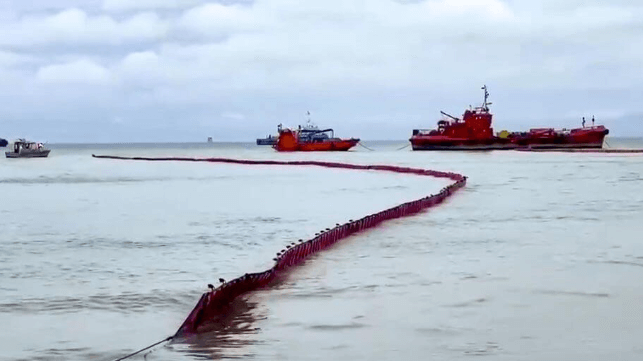Faced With Public Pressure, Russia Steps Up Kerch Strait Cleanup

One month after two aging coastal tankers broke up near the Kerch Strait, their cargoes of heavy fuel oil continue to contaminate beaches in Crimea and Krasnodar, and Russian authorities have decided to ramp up the the response.
Last month, the aging river-sea tanker Volgoneft 212 sank in a severe storm about five nautical miles outside of the Kerch Strait. The tanker Volgoneft 239 went aground off Taman shortly after, and it gradually broke up and began leaking its cargo. The two tankers were each carrying thousands of tonnes of mazut, a Russian grade of heavy fuel oil; Russian officials claim that the majority of the sludgy cargo did not spill, but mazut has been washing up around the region for weeks in significant quantities. Both vessels were more than 50 years old, and the head of Russia's maritime trade union told state outlet TASS that they were never designed for the rough conditions of the Kerch Strait in a winter storm; the masters of both vessels have been arrested and charged, but the remainder of the aging river-sea tanker fleet continues to trade in the area without interruption.
On Friday, Russian President Vladimir Putin called the spill "one of the most serious environmental challenges" that Russia has recently encountered. The port of Taman is particularly affected, according to Emergency Situations Minister Alexander Kurenkov, as it is nearest to the wreck of the Volgoneft-239, which continues to leak. The remaining fuel in the damaged tanker's stern section will be pumped off, Kurenkov said.
After weeks of citizen complaints, a new federal emergency task force has been set up to deal with the crisis. Local volunteers have reported limited support from the government for heavy cleanup on the tourist beaches of the Krasnodar region, which have borne the brunt of the impact. Over 10,000 people have joined the cleanup effort, and more than 80,000 tonnes of sand-oil mix have been collected to date - but volunteer efforts to shovel and bag the oiled beach sand have been spoiled in some places by re-spillage of unremoved waste.
The environmental hazard from the spill is significant enough that Russia may decide to ban the sale of fish caught in the Black Sea and Sea of Azov - though no ban has been implemented yet. Wildlife impacts are significant, with region-wide reports of oiled seabirds and dozens of reported deaths of dolphins.
